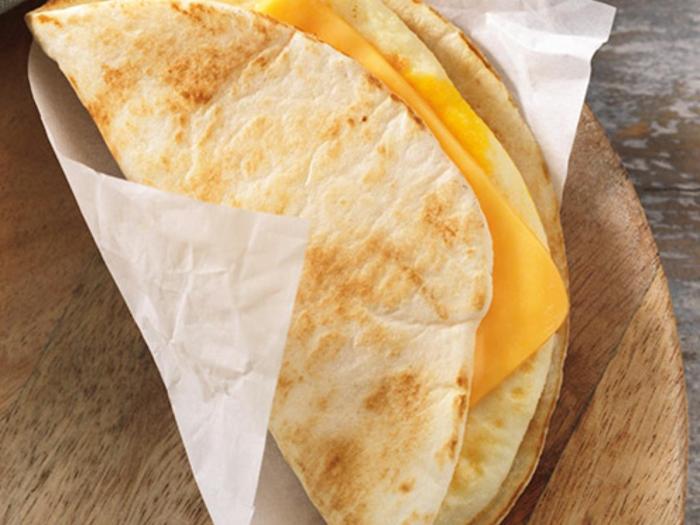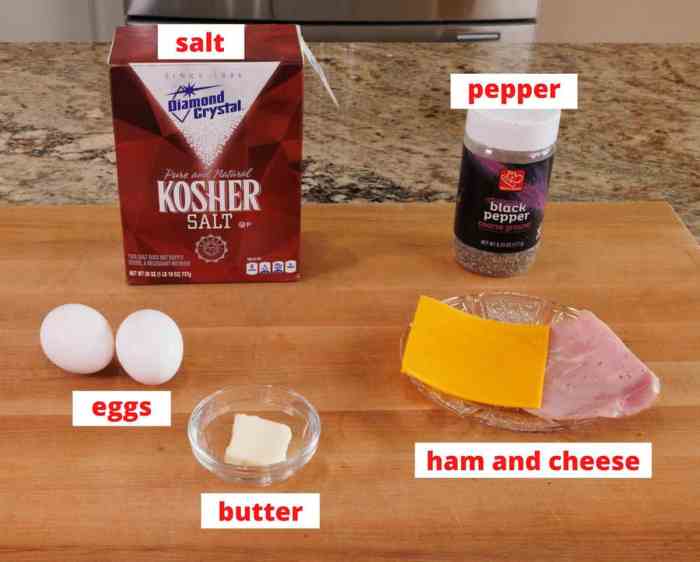Defining the “Egg and Cheese Wake Up Wrap”

Egg and cheese wake up wrap nutrition – Ah, the Egg and Cheese Wake Up Wrap – a culinary masterpiece born from the chaotic yet glorious intersection of breakfast and portability. This seemingly simple creation is a testament to the power of efficient, delicious sustenance, a quick fix for those mornings when even the thought of cereal feels like climbing Mount Everest. But beneath its unassuming exterior lies a world of variation, a spectrum of flavor and nutritional profiles as diverse as the people who consume it.
The typical commercially available Egg and Cheese Wake Up Wrap usually consists of scrambled eggs (sometimes with added seasonings), a slice or two of cheese (cheddar being a common choice), all nestled within a flour tortilla. However, the beauty of this breakfast staple lies in its adaptability. It’s a blank canvas for culinary creativity, often subject to the whims of the establishment or the individual’s personal preferences.
Ingredient Variations Across Brands and Recipes
The seemingly simple Egg and Cheese Wake Up Wrap can undergo significant transformations depending on the brand or home chef’s recipe. The tortilla itself can range from a standard flour tortilla to whole wheat, spinach, or even low-carb options. The cheese selection is similarly diverse, potentially including cheddar, Monterey Jack, pepper jack, American cheese, or even a blend. Beyond cheese, additions like bacon, sausage, ham, different types of vegetables (onions, peppers, spinach), and various spices (everything bagel seasoning, jalapeños, etc.) can all dramatically alter the final product.
Some establishments may even use different egg preparations, such as omelets or frittatas, further enhancing the variability.
Nutritional Content Differences Based on Ingredient Variations
The nutritional content of an Egg and Cheese Wake Up Wrap is highly dependent on the specific ingredients used. A wrap made with a whole wheat tortilla, low-fat cheese, and leaner protein sources will have a lower calorie and fat count, and potentially a higher fiber content, compared to one made with a standard flour tortilla, full-fat cheese, and added meats.
The type of cheese plays a significant role, with higher-fat cheeses like cheddar contributing substantially to the overall fat and calorie content. Similarly, the addition of bacon or sausage will dramatically increase the calorie and fat content, while adding vegetables can boost the fiber and vitamin content. For instance, a wrap with spinach will offer a nutritional boost not present in a plain cheese and egg version.
Nutritional Comparison of Three Commercially Available Wraps
The following table presents a hypothetical comparison of the nutritional information of three different commercially available egg and cheese wake-up wraps. Note that these values are estimates and can vary depending on the specific product and serving size. It’s always best to check the nutritional label on the packaging for the most accurate information.
| Brand | Calories | Fat (grams) | Protein (grams) |
|---|---|---|---|
| Wakey Wrap Co. | 350 | 18 | 15 |
| Sunrise Snacks | 400 | 22 | 12 |
| Morning Munchies | 300 | 12 | 18 |
Macronutrient Breakdown: Egg And Cheese Wake Up Wrap Nutrition

Let’s delve into the delicious, yet surprisingly complex, world of the egg and cheese wake-up wrap’s nutritional profile. We’ll dissect its macronutrient composition – the carbohydrates, fats, and proteins that fuel your morning (and possibly your afternoon, depending on the size!). Prepare for a nutritional adventure!The average egg and cheese wake-up wrap, depending on the ingredients and portion size, typically contains a macronutrient profile that’s a delightful, if somewhat carb-heavy, mix.
We’re talking roughly 300-400 calories, with a significant portion coming from carbohydrates, followed by protein and fats. However, this is a broad estimate, and the actual values can fluctuate wildly based on the ingredients used. Think of it as a nutritional rollercoaster – exciting, but potentially bumpy!
Carbohydrate Sources and Content
The primary source of carbohydrates in your average wake-up wrap is, unsurprisingly, the bread or tortilla. A flour tortilla contributes a significant amount of carbohydrates, primarily in the form of simple starches. The type of flour (white, whole wheat) greatly influences the nutritional value, with whole wheat offering more fiber and complex carbohydrates for sustained energy. Other potential sources of carbohydrates include any added sauces or condiments.
Consider this the foundation of your wrap’s nutritional structure – a sturdy base, or a potentially sugary swamp, depending on your choices.
Fat Sources and Content
Fats primarily come from the cheese, eggs (especially the yolk), and any added butter or oil used in cooking. The type of cheese significantly impacts the fat content and its nutritional profile. A cheddar cheese wrap will pack a different punch than a low-fat mozzarella version. The eggs contribute healthy fats, primarily unsaturated fats, which are generally considered beneficial for heart health.
Understanding the nutritional content of an egg and cheese wake-up wrap requires considering all ingredients. A key component is the cheese, and if you’re using pepper jack, you’ll want to check the specifics; you can find detailed information on pepper jack cheese nutrition facts to better manage your overall intake. This allows for a more accurate assessment of the total fat, protein, and calorie count in your breakfast wrap.
Think of the fats as the delicious, creamy frosting on your nutritional cake – a bit of indulgence is allowed!
Protein Sources and Content
The protein content is largely driven by the eggs and cheese. Eggs are a fantastic source of high-quality protein, providing all essential amino acids. Cheese also contributes a decent amount of protein, though the quantity varies depending on the type and amount used. The protein in your wrap is the structural support – ensuring you feel full and satisfied, rather than crashing after that initial sugar rush.
Macronutrient Profile Compared to Recommended Daily Intakes
A single egg and cheese wake-up wrap is unlikely to provide a significant portion of your recommended daily intake of all macronutrients. It is typically high in carbohydrates and moderate in protein and fats. It’s best considered a component of a balanced diet, not a complete meal replacement. Think of it as a single piece of a much larger nutritional puzzle.
Impact of Different Bread/Tortilla Choices, Egg and cheese wake up wrap nutrition
The choice of bread or tortilla significantly influences the macronutrient profile.
- Flour Tortilla (White): High in simple carbohydrates, lower in fiber.
- Flour Tortilla (Whole Wheat): Higher in fiber and complex carbohydrates, more sustained energy.
- Whole Wheat Bread: Similar to whole wheat tortilla, offering more fiber and complex carbs.
- Low-Carb Tortilla/Bread: Significantly reduces carbohydrate content, but may impact taste and texture.
Comparison to Other Breakfast Options
Let’s face it, the culinary landscape of breakfast is a battlefield of bagels, bowls, and bewildering boxes of cereal. Our humble egg and cheese wake-up wrap bravely enters this arena, ready to rumble with the nutritional heavyweights. But how does it stack up against the competition? We’ll delve into the delicious details, comparing our champion wrap to other breakfast contenders, exploring the nutritional pros and cons of each.
Prepare for a breakfast brawl!The egg and cheese wake-up wrap, with its convenient portability and satisfying blend of protein and fat, offers a quick and relatively energy-dense start to the day. However, its nutritional profile can be improved. Compared to other options, it may be lower in fiber and certain vitamins and minerals, depending on the ingredients. Let’s examine some key competitors and their strengths and weaknesses.
Nutritional Comparison of Breakfast Options
Oatmeal, a breakfast staple, boasts a high fiber content, contributing to satiety and digestive health. A serving of oatmeal provides significant amounts of soluble fiber, which can help lower cholesterol levels. However, it can be lower in protein compared to the egg and cheese wrap, and the nutritional value varies greatly depending on added sugars, fruits, and nuts.
Yogurt, particularly Greek yogurt, offers a fantastic source of protein, calcium, and probiotics, supporting gut health. However, added sugars in many commercially available yogurts can negate some of these benefits. Finally, cereals often come loaded with sugar and refined carbohydrates, providing a quick energy boost but lacking the sustained energy and nutritional density of other options. Many cereals are fortified with vitamins and minerals, but this doesn’t always compensate for the sugar content.
The choice depends on individual dietary needs and preferences, with each option presenting a unique balance of advantages and disadvantages.
Healthier Alternatives to the Egg and Cheese Wake-Up Wrap
Choosing a breakfast that fuels your body without weighing it down is key. Here are three healthier alternatives to the egg and cheese wake-up wrap, focusing on boosting nutritional value while maintaining convenience:
The following list highlights three healthier alternatives and their nutritional benefits:
- Whole-wheat avocado toast with a poached egg: This option provides healthy fats from the avocado, fiber from the whole-wheat toast, and protein from the egg. The combination offers sustained energy and essential nutrients, unlike many processed breakfast options. Imagine a perfectly ripe avocado, its creamy texture contrasting beautifully with the firm, slightly runny yolk of the poached egg. The whole-wheat toast adds a satisfying crunch and a boost of fiber.
- Smoothie with fruits, vegetables, and protein powder: A well-balanced smoothie can be a powerhouse of nutrients. Think spinach for iron, berries for antioxidants, banana for potassium, and protein powder for a sustained energy release. This option allows for customization based on individual dietary needs and preferences. Picture a vibrant green smoothie, bursting with the flavors of fresh fruit and a subtle hint of spinach.
The protein powder adds a creamy texture and a boost of protein to keep you feeling full and energized.
- Breakfast burrito with scrambled eggs, black beans, and salsa: This option provides a satisfying and balanced meal. The eggs offer protein, the black beans contribute fiber and protein, and the salsa adds vitamins and flavor. This is a more nutrient-dense and filling alternative to the typical egg and cheese wrap, offering a wider range of vitamins, minerals, and fiber. Imagine a warm, fluffy burrito filled with colorful ingredients.
The scrambled eggs provide a protein-rich base, while the black beans and salsa add texture, flavor, and a nutritional boost.
Common Queries
Are egg and cheese wake-up wraps a good source of protein?
Yes, they provide a moderate amount of protein, primarily from the eggs and potentially the cheese, contributing to satiety and muscle maintenance.
Are there vegetarian or vegan alternatives to egg and cheese wake-up wraps?
Yes, many brands offer vegetarian options using substitutes for eggs and cheese, and vegan versions are also becoming increasingly available, often featuring tofu scramble or plant-based cheese alternatives.
How can I reduce the fat content of my egg and cheese wake-up wrap?
Choose a wrap made with whole wheat or a lower-calorie tortilla. Opt for lower-fat cheese varieties, and consider adding vegetables for extra volume and nutrients.
Do egg and cheese wake-up wraps contain added sugars?
Some brands may contain added sugars, particularly in the tortilla or sauce. Checking the nutrition label is crucial to determine the added sugar content.
